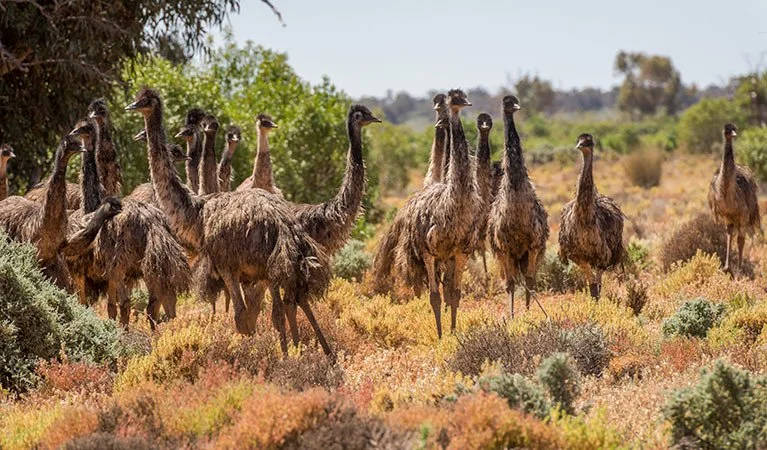Rise of the Emu-pire: The Emu War, 1932
APPROXIMATE COMMITTEE SIZE: 25 delegates
Following World War I, the Australian government provided land grants to returning soldiers in Western Australia, encouraging them to take up farming in the country’s interior. By the early 1930s, however, these farmers were facing harsh economic conditions brought on by the Great Depression and plummeting wheat prices. To make matters worse, they found themselves contending with a new threat – tens of thousands of emus migrating inland from the coast during their annual breeding season. In late 1932, the emus began descending on the newly cultivated farmlands, trampling fences, devouring crops, and generally wreaking havoc. Desperate and with few resources, the farmers turned to the federal government for help. The response was both unconventional and controversial: send in the military. Under the direction of Minister of Defense Sir George Pearce, a detachment of soldiers armed with Lewis machine guns was dispatched to Western Australia to combat the emu “army.”
Delegates must work to address the impending threat of the emus as the political climate around them descends into turmoil. They will be forced to balance the demands of angry farmers, the divided desires of parliament, concerned conservationists, and the threat of Western Australia’s succession. In order to maintain unity and order, delegates will have to advocate for their own interests while simultaneously working together to address the issues before them.
CHAIR: Sophia Alexandrou
CRISIS MANAGER: Valli Pendyala
ISSUES TO CONSIDER
Emu-Driven Food and Economic Insecurity
Environmental Impacts of Mass Emu Slaughter
The West Australian Secession Movement
LEARNING OBJECTIVES
Consider how to balance the need for citizen’s safety and economic security with the desire to preserve living species and the environment.
Examine the use of secession and threats of secession for political progress.
Debate how best to balance the vastly different needs of smaller factions within a larger, unified nation.
About the Chair
Sophia Alexandrou is a member of the class of 2027. She is in the School of Foreign Service, majoring in International Politics with a concentration in International Law, Institutions, and Ethics, and minoring in Environment & Sustainability and Modern Greek. This is her second time staffing NAIMUN and her first time as Chair! Outside of MUN, she is involved in Sunrise Georgetown, GREEN, H*yas for Choice, and the Hellenic Society. In her free time, you can find her listening to a Broadway musical cast album, going on walks, and doing jigsaw puzzles. She is so excited to welcome you to DC and serve as your chair in Rise of the Emu-pire!
About the Crisis manager
Valli Pendyala is a member of the School of Foreign Service’s class of 2027. They have been very involved with Model UN throughout their time at Georgetown, having previously served as NCSC LII’s Director of Operations and GIRA Local’s Chief of Staff and having staffed NCSC LI and NAIMUN LXI & LXII. Outside of Model UN, they are involved in GUPride, are a student leader in Dharmic Life, and sing tenor in the choir! In their free time, you can find them trying to finish their annual 52-book reading challenge, going on food-related sidequests, or debating whether or not a country can (a) declare war on a noun and (b) whether or not it can win. They are very excited to serve as your crisis manager and cannot wait to welcome you to DC and NAIMUN LXIII!
Committee Speaker
Dr. Alan Tidwell is the Director of the Center for Australian, New Zealand, and Pacific Studies (CANZPS) at the Georgetown University Walsh School of Foreign Service. His areas of interest include the Australian-American alliance, politics of foreign affairs, smaller states, and conflict resolution. Prior to joining Georgetown University, he was a program officer with the United States Institute of Peace, where he specialized in conflict resolution and capacity building in Southeast Asia. His work focused particularly on the peace processes in Mindanao and Aceh. Tidwell collaborated with scholars from these conflict-affected regions to develop conflict resolution curriculum programs. In 1992, Tidwell, a Washington D.C. native, moved to Sydney, Australia, where he was a lecturer in the Centre for Conflict Resolution at Macquarie University. Later, he moved to Sydney University, where he became the research director of the Australian Centre for American Studies. At Sydney University, Tidwell focused on enhancing the Australian-American relationship through research and public education. He returned to Macquarie University as a senior lecturer at the Graduate School of Management, specializing in conflict resolution and negotiation. He holds a Ph.D. in international relations from the University of Kent, a Master’s in professional ethics from the University of New South Wales, and a Master’s degree in conflict management from George Mason University.




